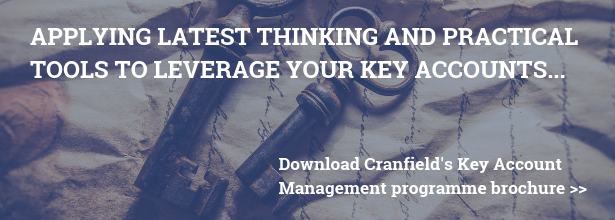/KAMBP/Why%20companies%20get%20KAM%20wrong%20Image%202019.jpg?width=615&name=Why%20companies%20get%20KAM%20wrong%20Image%202019.jpg)
Professor Malcolm McDonald explores 6 thought-provoking viewpoints on why many organisations are getting Key Account Management hopelessly wrong.
- Ask any director of any company what their biggest challenges is, and the answer is always ‘how to deal profitably with big, powerful customers’. There are only 10 car companies in the world; in the UK most grocery products go through five mega supermarket groups and so on. Power is being increasingly concentrated in a few large customers. Yet, in spite of this, Key Account Management (KAM) is rarely taught at Business Schools in the UK. The result? MBA and MSc students in the main leave their advanced, expensive programmes ill-equipped to deal with the realities of the modern world.
- One of the most important topics of the modern world, how to deal profitably with big, powerful customers, is grossly neglected on their curricula. Furthermore, little real research on the topic takes place in Business Schools with the exception of Cranfield School of Management.
- KAM requires a deep understanding of the business of major customers. This requires KAM managers who are fully trained to General Management level. Instead, most companies have sales people who are paid to sell. But unless they’re paid to analyse in detail the business of their customers in order to prepare solutions that create advantage for them, they will continue to just sell, much to the annoyance of their would-be customers.
- Most companies think that KAM is “selling with knobs on”. Consequently, most have completely the wrong kind of people dealing with big companies. Yet our research at Cranfield proves clearly that important customers literally HATE being sold to. They demand senior, totally business-trained ‘general manager’ type executives who thoroughly understand finance, their processes, their organisation and their culture, who can offer solutions that create advantage for them rather than solutions that merely help them to avoid disadvantage.
- Our research with the European Institute of Purchasing proves beyond doubt that companies detest gangs of sales people dressed up as Key Account Managers descending on them to sell their stuff. We really need to grow up and listen to these people. Nothing less than a root and branch reorganisation of KAM in most companies is called for.
- One of the quickest ways to go bankrupt is to ‘delight’ your customers! Most companies fail to classify their major customer according to the potential of each to grow the supplier’s profits over a three-year period and according to the supplier’s competitive strengths with each major customer. Such a classification would lead to the correct setting of objectives and allocation of scarce resources. Unless this is done, you frequently come across companies with ridiculous and self-destroying policies based on maximising profit from every customer, even though some should be managed for net free cash flows, some for net present value and others should be invested in to build future competitive advantage.
Our work in this area is critical to achieving successful key account management programs for organisations looking to succeed at managing key account customers. For the past twenty years, Cranfield has pioneered the development of Key Account Management research in Europe through the KAM Best Practice Research Club. Working with world leading businesses to adopt new frameworks and best practice to fully leverage key relationships and strategies. This new frontier knowledge is continually integrated into our Key Account Management Programme
Blog produced by: Professor Malcolm McDonald, Emeritus Professor at Cranfield School of Management.
Interested in joining Cranfield's KAM Best Practice Research Club? Learn more about what our Club can offer you and your organisation.
Read more:
- How can you co-create value with your strategic customers?
- Creating compelling customer value propositions
- Implementing Key Account Management: To plan or not to plan
- A ten-step framework for setting effective sales targets
- Advance your career: How to go from middle weight to heavy weight in 2019



/KAMBP/Why%20companies%20get%20KAM%20wrong%20Image%202019.jpg)
